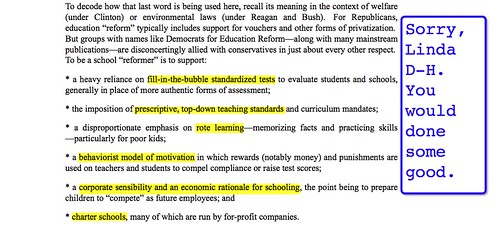What are
digital learners really like?
The conclusions are sane, compassionate, and compelling: in a nutshell, the "serious" stuff we all hope kids will do online (researching papers and so on) are only possible within a framework of "hanging out, messing around and geeking out." That is to say, all the "time-wasting" social stuff kids do online are key to their explorations and education online.
So what does this mean for teachers at all levels?
First, Facebook, YouTube, WorldOfWarcraft, iPods, and mobile tech are
ensconced in youth culture. This means not only that it is a deep part of their common lives, but that the right to its use will be defended Alamo-style. This means that peer culture will be an even harder nut to break through to. So...do we need to 'teach' this stuff or facilitate its use. Or some other path that Frost never ever dreamed of.
Second, these digerati use the network to mostly reinforce existing peer networks, but also to join specialized new ones. I have long thought that we need to adopt an added stance as learning brokers for our students, guiding them toward the best tools and people that fit their strengths and interests.
Third, students need to be shown the meta of learning. They are already powerful learners within these new social networks so how do we get them to become aware of and to leverage their own strategies. Yes, learning how to play one simulation is useful in playing another, but how can that learning be extended into the F2F?
Fourth, don't bother assessing this stuff. The network has its own methods that it users either buy into or don't.
I am going to read the whole report and write more later, but for now I leave you with this quote from a fifteen year old Georgia student:
Trial and error, I guess. It’s like any—whenever I learn anything with computers, I’ve
taught myself how to use computers, and I consider myself very knowledgeable about
them, but I just—I learn everything on my own, just figure it out, and the same with cam-
eras. It’s like a cell phone. I just figure out how to do it, and it’s pretty quick and easy”
(Patricia Lange, YouTube and Video Bloggers).
(
continue reading &aquo;)



